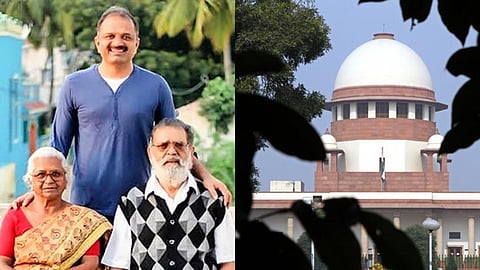

CHENNAI: In a watershed moment in the Indian judiciary, the Supreme Court on Wednesday exercised Article 142 to order the release of Rajiv Gandhi's assassination case convict AG Perarivalan.
Perarivalan was imprisoned after former prime minister Rajiv Gandhi was killed in an explosion in Sriperumbudur while the latter was in an election rally. The accusation arraigned of Perarivalan was that he brought battery cells that were to be used by LTTE militants in eliminating Rajiv.
Perarivalan and six others, Nalini, Murugan, Santhan, Robert Payas, Ravichandran and Jayakumar, were imprisoned for life. The death sentences were awarded to Nalini, Santhan, Murugan and Perarivalan. Their death sentence, except Nalini whose sentence was commuted in 2000, was commuted to a life sentence in 2014 after a prolonged legal battle.
Later, he filed a mercy petition in 2015 which was hitherto gathering dust. Earlier, the Supreme Court said that the Governor forwarding Perarivalan's mercy plea to President has no constitutional basis.
The Apex Court, on Wednesday, used Article 142, which grants it the sweeping powers to serve complete justice in a case under its jurisdiction. The bench comprising Justices L Nageswara Rao, BR Gavai and AS Bopanna wielded this constitutional provision citing that the accused had already spent 30 years in prison, and had also taken note of his good conduct and academic success in his jail period. Moreover, there was inactivity concerning his mercy plea since 2015.
Amid a sudden curiosity among the public on Article 142, DTNext explains what the Article is about and what are its powers and limitations.
How did Article 142 come about?
The Article featured in the Constitutional debate empowers Supreme Court with sweeping powers to render complete justice. The Article was unanimously adopted by the Constitutional Assembly on May 27, 1949
What does the Constitution say about Article 142?
* The Supreme Court in the exercise of its jurisdiction may pass such decree or make such order as is necessary for doing complete justice in any cause or matter pending before it, and any decree so passed order so made shall be enforceable throughout the territory of India in such manner as may be prescribed by or under any law made by Parliament and, until provision in that behalf is so made, in such manner as the President may by order prescribe.
* Subject to the provisions of any law made on this behalf by Parliament, the Supreme Court shall, as respects the whole of the territory of India, have all and every power to make an order for securing the attendance of any person, the discovery or production of any documents, or the investigation or punishment of any contempt of itself.
What volition does the Article grant to the Supreme Court?
In the Chandrakant Patil & Ors v State through CBI case of 1998, the top court says the Article can only be exercised to serve complete justice. In another case in the same year, SC Bar association vs Union of India, the Supreme Court held that the Article is supplementary, complementary and residuary to the powers granted to it.
What are the Article's limitations?
In the Union of India v State of Maharashtra (2019) case, the Supreme Court observed that Article 142 cannot be exercised to intrude in the legislative territory.
This Article gains more power as the preceding Article 141 states that the SC order is binding on all courts within Indian territory.
Visit news.dtnext.in to explore our interactive epaper!
Download the DT Next app for more exciting features!
Click here for iOS
Click here for Android